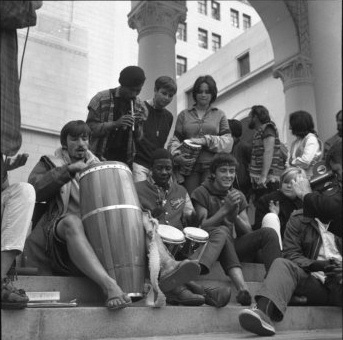Is hipsterism still a thing?
Even the New York Times trendpieces are at least five years old by this point. Williamsburg is aging (Bushwick’s barely affordable), Urban Outfitters so longs to be relevant that it repeatedly tries to make racism twee, and ironic mustaches are so eyeroll-worthy that anyone sporting one is likely doing so with another thick layer of irony — I know mustaches are overdone; I’m ironically re-appropriating the ironic handlebar mustache as a comment on the capitalist fascism of modern fashion.
To me, hipsters seem so very 2009. Sure, they’re still around, but they’re hardly notable — the fashions and music tastes that once screamed “hipster” are now commonplace. More damning, hipster attitudes (that trademark blase jadedness that somehow exists, cognitive dissonance be damned, alongside an unbridled passion for niche discoveries and artisan crafts) have gone mainstream: the distrust of big businesses and avowed faith in anything appended with “artisan” or “handmade” is standard upper-middle class yuppie fare. It’s just as Upper West Side brownstone as it is Bushwick loft.
But a search for Booker Little footage a few weeks ago yielded a surprising discovery for me — hipsterism isn’t a millennial fad, but rather an enduring counter culture that existed in a nearly identical state in 1959.
This video, a clip from the CBS television series Look Up And Live — an episode entitled “The Delinquent, the Hipster, and the Square,” begins with the Max Roach Quintet playing a Second Floor Music publication, Booker Little’s “Minor Mood Blues.” The narrator, perhaps intended to be an example of the archetypical “square” with his blonde comb-over and buttoned-up suit, goes on to introduce the audience to the hipster set as a couple acts out hipster behavior as an example:
The hipster does not react to the music openly. He claims to be beyond the reach of any stimulus. Similarly, the hipsters rarely dance, for dancing is a social act — not that these young people are antisocial; they’re merely passive. They consider any attachment to others, any argument or violence as strictly “square.”
A 2010 article on Pitch.com translates for the millennial set:

The clip goes on to define some hipster terminology, one of which I propose should make its way back into our speech — “black shoe,” meaning “formal and sober.” First of all, cheers to the hipsters of yesterday for understanding that any formal event should not be sober. And for choosing the most benign part of a formal ensemble, a black shoe, to serve as a synecdoche for the entire sorry state.
After watching this amusing clip, I couldn’t help but wonder how today’s hipsters might react. With their entire identity gone mainstream, would it ruin them to know that their movement was as old as their parents? Or would that give them the fortitude to know that hipsterism has staying power, even if it’s rather trite these days?
And if hipsterism is a cultural inevitability — a lasting counter-culture that has and will continue to withstand the tests of time — whom do I contact to ensure that “black shoe” becomes a thing again.
(I’ll hold off giving any description of the quintet’s performance, as I’d rather not spoil it. Suffice it to say that if anyone had any doubts of Booker Little’s abilities, this brief clip should put them to rest.)

